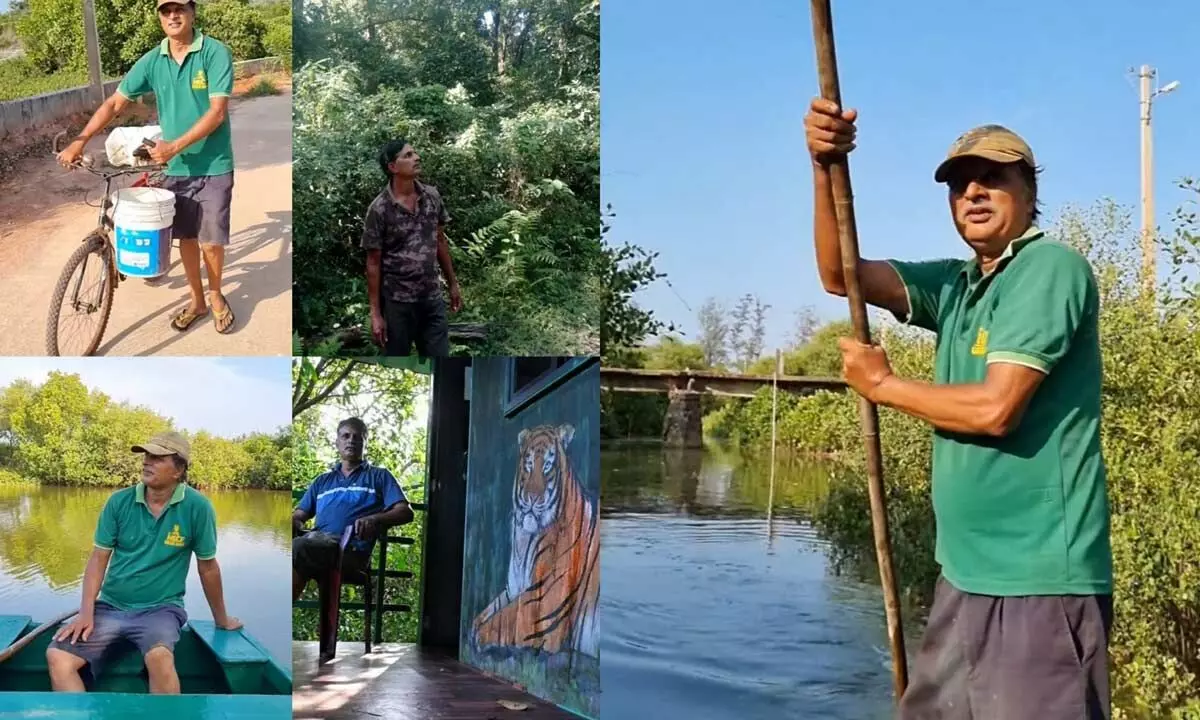Retiree turns waste quarry land into a mini forest

The 63-year-old Desa, after retiring from a humble job in Mumbai, moved to Satwadi in 2017, leaving his wife and son behind to pursue his dream of cultivating a forest and dedicating the rest of his life to nature in his native region
Bengaluru: Dasabettu Mathayes D'Sa, popularly known as Desa, has accomplished what many could not even contemplate. He spent his entire retirement savings to purchase a wasteland -- a red stone quarry -- and planted a variety of wild trees that are on the verge of extinction.
Desa's determination to transform the wasteland into a mini forest is inspiring, especially on the eve of the COP28 Summitin Dubai focused on the climate challenge.
The flourishing mini forest now stands in place of the scarred land, once marked by deep trenches, covering three-fourths of an acre in Satwadi, a small village near Kundapura town in the Dakshina Kannada district of Karnataka.
The 63-year-old Desa, after retiring from a humble job in Mumbai, moved to Satwadi in 2017, leaving his wife and son behind to pursue his dream of cultivating a forest and dedicating the rest of his life to nature in his native region.
Residing in Moodlakatte near Kundapura, merely a kilometre away from his dream forest, Desa relies on a bicycle as his primary mode of transport. He also owns a small boat with a tiny petrol engine, allowing him to explore the mangrove forest near his house. In Kundapura, he actively spreads awareness about the importance of mangrove forests among nature lovers, students, and journalists. Additionally, he contributes to making the area a tourist hub by taking people on boat rides to explore the beauty of the small trees growing in coastal saline or brackish water, providing self-employment opportunities to locals. Desa also contributes to greening his village roads by planting and watering plants.
In an interview with IANS, Desa explained that his inspiration came from the novel "Swapnada Hole" by well-known Kannada author K. Shivaram Karanth. “I belong to the Christian community. Despite community members' curses for not attending church masses, I had dedicated my weekends to nature trips,” Desa says.
He is a long-time member of the Bombay Natural History Society (BNHS), has attended various nature camps nationwide for wildlife studies with BNHS, and is a lifetime member of the Youth Hostels Association of India (YHAI), participating in numerous trekking programmes at both state and national levels.
Desa has volunteered for wildlife studies in the Nallamala forest with the Government of Telangana Wildlife Department and has led countless students and professionals in various trekking programs.
Describing the challenges of growing a forest on quarry land, Desa highlighted the difficulty of dealing with trenches up to 15 feet deep, where the land below that depth is infertile.
Despite the financial constraints for levelling the land, Desa has managed to grow tree saplings in the existing trenches. Reflecting on his decision to retire in Satwadi instead of pursuing a watchman's job in Mumbai, Desa emphasized the joy of reliving childhood days through reading, wandering in forests, and fishing.Desa passionately believes that the survival of the land depends on the existence of forests. He criticizes politicians for their soft stance on forest destruction and points out the encroachment of forests by politicians and elites, particularly in the birthplace of the Cauvery river, where vast acres of coffee plantations have replaced natural forests. Desa emphasizes that people will only realize the importance of forests during water shortages in big cities, calling attention to the collective responsibility to protect these
crucial ecosystems.











